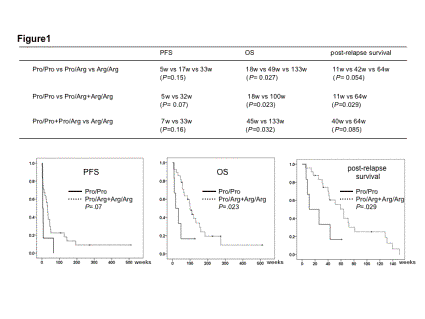Abstract
Recently, newly developed drugs such as thalidomide, lenalidomide and bortezomib have significantly improved survival of the patients with multiple myeloma (MM). However, certain group of the patients who have characteristic high-risk cytogenetic changes such as deletion of TP53 tumor suppressor gene revealed significantly shorter survival. In patients with deletion of TP53 gene, the somatic point mutation in the residual TP53 gene has been reported to be rare. Thus, the exact role of alteration of TP53 gene in high-risk myeloma remains unclear. Polymorphism of TP53 gene at codon 72 in exon 4, CGC to CCC transition, leads to arginine (Arg) to proline (Pro) amino-acid substitution. Biological analyses showed that the Arg variant more efficiently induces expression of P21 and apoptosis via Ser-6 and 20 phosphorylation of p53 protein. In contrast the Pro variant is less resistant to MDM-2-mediated degradation and more potently induced cell-cycle arrest and DNA damage repair. Recently, clinical significance of this polymorphism has been extensively studied in solid tumors as well as hematological malignancies including non-Hodgkin lymphoma and leukemia. However, consistent association of the polymorphism with cancer risk has not been elucidated.
The purpose of this study is to examine codon 72 polymorphism in patients with refractory multiple myeloma (MM) treated with thalidomide, and to elucidate its association with myeloma risk and outcome of thalidomide-therapy.
A total of 37 Japanese patients with refractory or relapsed MM who were treated with thalidomide monotherapy were included in this study. Three cases showed deletion of TP53 gene by fluorescence in situ hybridization (FISH) analyses. The codon 72 polymorphism was evaluated in the rest of 34 patients. Genomic DNA was isolated from bone marrow mononuclear cells. The genomic TP53 gene was amplified by polymerase chain reaction, and the amplified DNAs were directly sequenced.
Direct DNA sequence showed that the Pro/Pro homozygote was observed in six patients (18%), Pro/Arg heterozygote in 12 (35%) and Arg/Arg homozygote in 16 (47%). There was no significant difference in the frequency of the polymorphism between the 34 Japanese MM patients and the healthy Japanese individuals (P=0.44). Thus, association of codon 72 polymorphism with myeloma risk has failed to be elucidated. The response rate to thalidomide therapy was 33% in the patients with Pro/Pro, 27% in Pro/Arg and 44% in Arg/Arg (P=0.49), respectively. Other clinical backgrounds including age, sex, Durie-Salomon stage, ISS stage, serum creatinine, albumin, b2M, calcium, hemoglobin levels and M-protein type were not correlated with TP53 codon 72 polymorphism, either.
Progression free survival (PFS), overall survival (OS) and post-relapse survival were shown in Figure 1. The patients with Pro allele tended to show shorter PFS; 5 weeks for the patients with Pro/Pro versus 32 weeks for those with Pro/Arg plus Arg/Arg (P=0.07) (Figure 1). Overall survival (OS) of the patients with Pro/Pro, Pro/Arg and Arg/Arg allele was 18 weeks, 49 weeks and 133 weeks, respectively (P=0.027). Especially, the patients with Pro/Pro allele revealed significantly shorter OS compared with those with Pro/Arg plus Arg/Arg (18 weeks versus 100 weeks, P=0.023) (Figure 1). Significant difference of OS in patients with Pro/Pro+Pro/Arg vs Arg/Arg (P= 0.032) suggested the dominant effect of Pro allele for poorer prognosis. Post-relapse survival of the patients with Pro/Pro, Pro/Arg and Arg/Arg allele was 11, 42 and 64 weeks, respectively (P=0.054). Post-relapse survival for Pro/Pro versus Pro/Arg plus Arg/Arg were 11 weeks versus 64 weeks (P=0.029).
These results indicated that codon 72 polymorphism did not correlated with myeloma risk, but significantly associated with therapeutic outcome. Namely, the patients with Pro allele revealed earlier relapse and shorter post-relapse survival, resulted in shorter OS in thalidomide therapy. Further evaluation is needed to clarify whether the codon 72 polymorphism will be a new prognostic marker for the treatment with novel drugs.
No relevant conflicts of interest to declare.
Author notes
Asterisk with author names denotes non-ASH members.


This feature is available to Subscribers Only
Sign In or Create an Account Close Modal